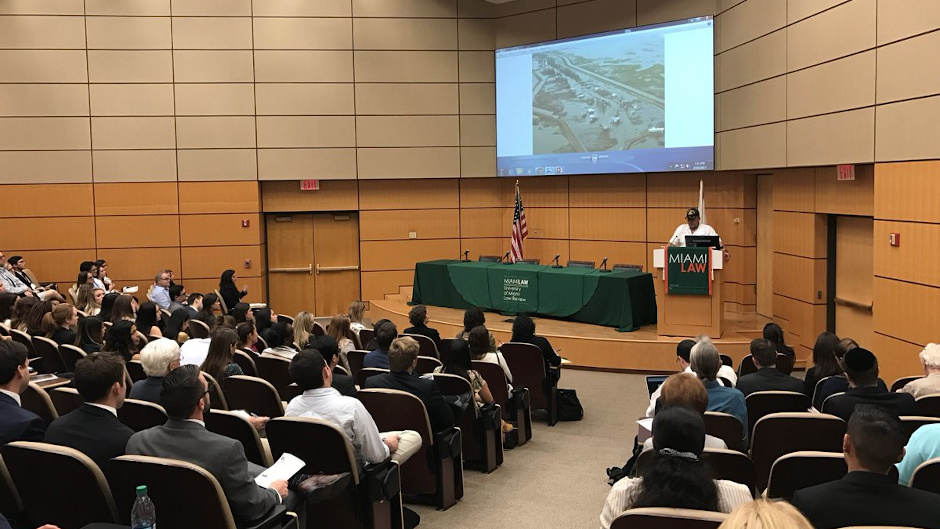The University of Miami Law Review explored the theme of global climate change during its annual symposium this past weekend at the Storer Auditorium on the Coral Gables campus.
The event – “Climate Wrongs and Human Rights” -- consisted of four panels of experts which delved into the human rights implications of global climate change in the contexts of immigration, democracy, and philosophy.
“The diversity of our panelists allowed for an interdisciplinary discourse that was both informing and inspiring,” said Sogol Ghomeshi, Symposium Editor of the UM Law Review. “We heard from climate scientists, lawyers, philosophers, professors, and sustainability professionals.”
Climate change as “a perfect storm”
Stephen Gardiner, Professor of Philosophy at the University of Washington and author of Debating Climate Ethics, analogized the dilemma of climate change with a “perfect storm,” a phenomenon in which several individually powerful destructive forces combine to form an unprecedented threat.
“With climate change, we face the intersection of major challenges to ethical action that severely threaten our ability to behave well with respect to this problem.”
The first of Gardiner’s points surrounded our propensity to disregard the long-term consequences of our actions, something he called “the intergenerational storm.”
“Many of the costs are deferred to the future to other people,” Gardiner said. “And this provides a serious temptation towards behaving badly from an ethical point of view.”
Secondly, the professor argued that combating climate change is difficult in a scientific environment in which new fields of inquiry are constantly arising. He called this the “theoretical storm.”
“Climate change brings together areas of thinking that are not very well developed so far. Issues of intergenerational ethics, for example, or what to do about scientific uncertainty.”
Gardiner argued that these issues fuse to corrupt our discussion of climate ethics. “What I’m worried about is that these threats to ethical action mean that there’s a standing threat to the way in which we … think and talk about the climate problem.”
Flooding impact on native American tribe
The Symposium’s keynote speaker was Chief Albert Naquin, an Ambassador for the Native Americans of the Louisiana Gulf Coast. The chief has had potent, first-hand experience with the deleterious effects of climate change.
With sea levels rising, the native land of the Biloxi-Chitimacha-Choctaw is under threat of flooding, and Chief Naquin is leading the effort to relocate the tribe. He was instrumental in securing a $52 million dollar grant from the U.S. government to aid in the relocation.
“We’re working to move to higher ground where we can rejuvenate our culture and our people to regain what we’ve lost throughout the years,” he said. “That’s our goal.”
Nuclear reactors, fracking and earthquakes
Jacqueline Patterson, Director of the NAACP Environmental and Climate Justice Program, emphasized the potential dangers of activities that are harmful to the environment.
“A number of our nuclear reactors are actually built on earthquake fault lines, and as we continue with this fracking, and we see this uptick in earthquakes, then we know that we’re flirting with a Fukushima Daiichi-type disaster.”
Patterson also highlighted the often overlooked detrimental health effects of such activities as coal mining and fracking. “All the different things that are driving climate change are also affecting the health and well-being of the communities that are in their shadows,” she said.
She pointed to the case of a boy suffering from severe asthma induced by sulfur dioxide gases emitted from a coal-fired power plant two miles from his home to illustrate the health detriments of such activities, and also the social detriments.
“With his life, he is often threatened with his varying ability to breath; he has a hard time sometimes going to school,” she said. Patterson also noted the child’s inability to engage socially with his peers due to often being excluded as he “can’t play like other kids.”
Patterson believes effective frontline leadership and encouraging members of the community to tell their own stories are key in combating the growing threat of climate change and its health consequences.
An eye on the earth’s future
The Symposium also featured Xavier Cortada, a three-time UM alumnus and artist whose work is oriented toward social engagement and the environment. Cortada invited all the members of the audience to participate in his “Do-Not-Open Project,” an initiative aimed at environmental consciousness and action.
Participants composed a letter in which they outlined their current thoughts on climate change and the environment, and their commitments to bettering the planet throughout the future. Cortada stores all of the letters in his archive at the Green Library at Florida International University, where they will remain unopened for either 25, 50, 100, or 200 years.
“It’s to connect present-day Miamians with the future so they can visualize the changes to come and hopefully act on them,” Cortada said regarding the goals of the project. “In other words, making it real.”
Sogol Ghomeshi hopes the Symposium will lead to substantial outcomes.
“We hope that our audience was able to walk away with not only a better understanding of the human rights implications of climate change, but also an agenda and plan of action on how to move forward and participate in addressing this global crisis.”
More on University of Miami Law Review
Read about studying Environmental Law at Miami Law

